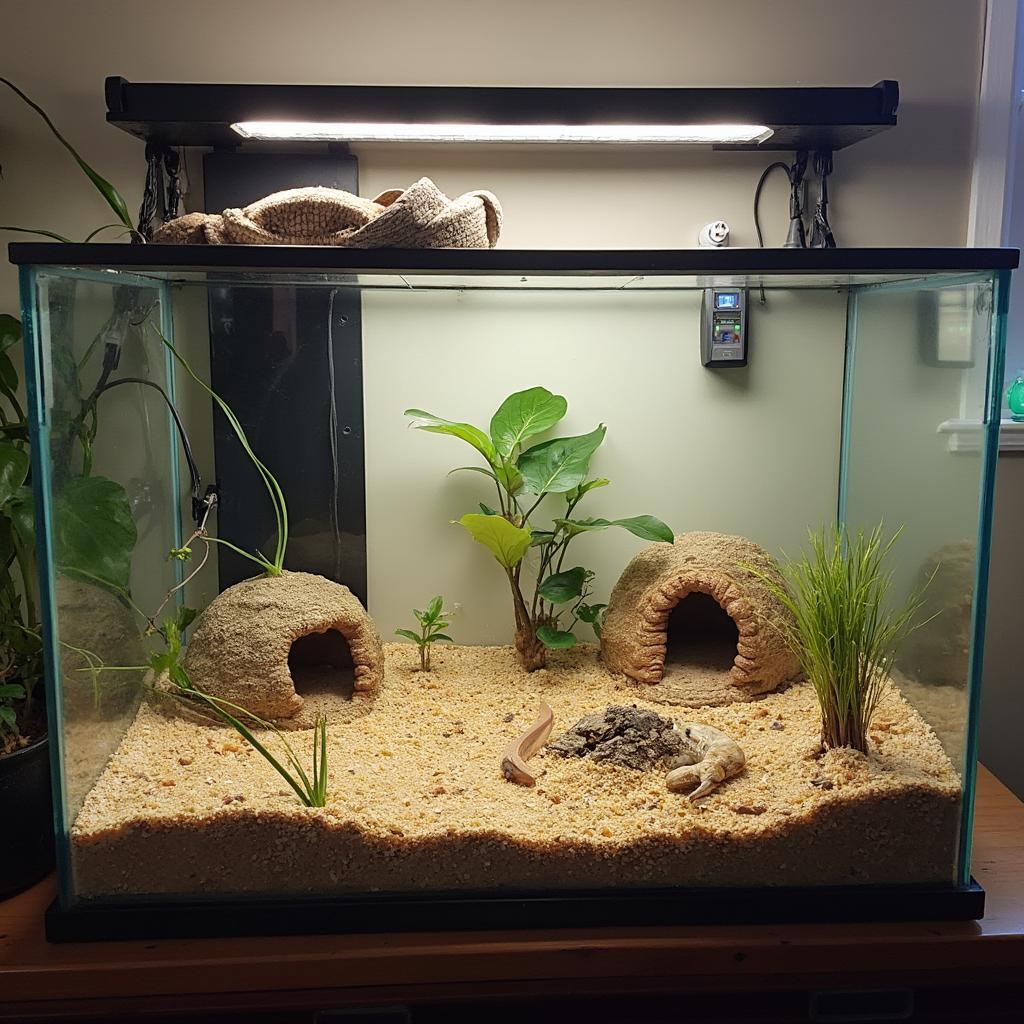Your cart is currently empty!

Kenyan Sand Boa Care Tips: A Comprehensive Guide
Kenyan sand boas are becoming increasingly popular pets due to their docile nature, small size, and relatively simple care requirements. However, like all living creatures, they have specific needs that must be met to ensure their health and well-being. This guide will provide comprehensive Kenyan Sand Boa Care Tips, covering everything from housing and feeding to handling and health concerns.
Housing Your Kenyan Sand Boa
Providing the correct habitat is crucial for your Kenyan sand boa’s health. A 10-20 gallon tank is suitable for a single adult, but larger is always better.
- Substrate: Use a substrate that allows for burrowing, such as aspen shavings, reptile sand, or a mixture of both. Avoid cedar or pine shavings, as they are toxic to reptiles. The substrate should be deep enough (3-4 inches) for your snake to burrow completely.
- Temperature and Humidity: Maintain a temperature gradient within the enclosure, with a warm side around 90-95°F (32-35°C) and a cool side around 75-80°F (24-27°C). Use an under-tank heater (UTH) placed on one side of the tank to create the warm side. A low humidity level of around 30-40% is ideal.
- Hides: Provide at least two hides, one on the warm side and one on the cool side. These can be commercially available reptile hides, or simple overturned plastic containers with an entrance cut out. Hides provide security and help regulate body temperature.
- Water Dish: A shallow water dish should be provided for drinking and soaking. Ensure the dish is heavy enough that it cannot be easily tipped over.
 Kenyan Sand Boa Enclosure Setup
Kenyan Sand Boa Enclosure Setup
Feeding Your Kenyan Sand Boa
Kenyan sand boas are constrictors and feed primarily on mice or small rats.
- Prey Size: Offer prey items that are slightly smaller than the widest part of the snake’s body.
- Feeding Frequency: Juveniles should be fed every 5-7 days, while adults can be fed every 7-10 days, or even less frequently depending on their size and metabolism.
- Frozen vs. Live Prey: Frozen/thawed prey is generally recommended over live prey to avoid the risk of injury to the snake.
- Feeding Technique: Use tongs to offer the thawed prey item to the snake. Avoid handling the snake for at least 24 hours after feeding.
Handling Your Kenyan Sand Boa
Kenyan sand boas are generally docile and tolerate handling well.
- Gentle Handling: Support the snake’s body evenly and avoid squeezing.
- Frequency: Handle your snake 1-2 times per week, for short periods (10-15 minutes).
- Washing Hands: Always wash your hands before and after handling your snake.
Common Health Concerns
While generally hardy, Kenyan sand boas can be susceptible to certain health issues.
- Respiratory Infections: These can be caused by improper humidity or temperature.
- Mites: These external parasites can cause skin irritation and stress.
- Stomach Impaction: This can occur if the snake ingests substrate while eating.
Conclusion
Kenyan sand boas make fascinating and rewarding pets. By following these Kenyan sand boa care tips, you can provide your snake with a healthy and enriching environment and enjoy many years of companionship. Remember, regular monitoring of your snake’s behavior, eating habits, and overall appearance is crucial for early detection of any potential health issues.
FAQ
- What is the average lifespan of a Kenyan sand boa? (15-20 years)
- Can Kenyan sand boas be housed together? (Generally, no, as they are solitary animals.)
- How can I tell if my Kenyan sand boa is shedding? (Its skin will appear dull and its eyes will become cloudy.)
- What should I do if my Kenyan sand boa refuses to eat? (Consult a reptile veterinarian.)
- Are Kenyan sand boas good for beginners? (Yes, they are relatively easy to care for.)
- How often should I clean my Kenyan sand boa’s enclosure? (Spot clean daily and completely replace the substrate every 2-3 months.)
- Do Kenyan sand boas need UVB lighting? (No, they do not require UVB lighting.)
Need more assistance? Contact us via WhatsApp: +1(641)206-8880, Email: [email protected] or visit us at 456 Pine Avenue, Toronto, ON M5V 2J4, Canada. We have a 24/7 customer support team.

Leave a Reply